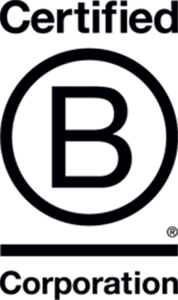When I first heard about B Corps, I was intrigued but skeptical. It sounded like something created for big brands with big budgets, showing up in glossy brochures and mission statements no one pays attention to.
Then, last summer, I noticed the B Corp logo on the menu of a pizza place in London. I chose to eat there because of it. That moment stays with me. It marked the point when I began shifting how I spent money, gravitating toward businesses that seemed to care about more than profit alone.
As a solo practitioner running a small law firm, B Corp Certification initially seemed out of reach. But as I continued to learn, I began to understand that it was not about size or visibility. It was about intention. I was already thinking about the kind of business I wanted to build, not just in terms of services or growth, but in how it reflects my values, shapes my legacy, and informs everyday decisions.
This was never about appearances. It was about making sure the values I speak about show up in how I work.
What Is a B Corp
B Corp Certification is not a political statement or a marketing trend. It is a third-party verification that a business meets high standards of social and environmental impact. It provides a legal and operational framework that supports businesses in considering people, planet, and profit equally.
Certification involves a comprehensive assessment of how a business operates, including its treatment of workers, use of resources, governance, and community impact. The process is intentionally rigorous. It is designed to be meaningful and to hold businesses accountable for the impact they create, not just the products or services they sell.
It is also about a global community. More than 9,000 certified businesses operate in over 90 countries. They include large brands and small service providers, all committed to the idea that business can be a force for good and can serve more than just shareholders.
What It Means
Being a B Corp means building a business that is grounded in values, not just in strategy. Certification does not dictate how to lead, but it offers a structure to ask better questions. Not just “Is this working,” but “Is this working in a way that reflects what I care about? Does it serve my clients, my community, and the kind of future I want to help shape?”
It is a shift from short-term thinking to long-term responsibility. It invites you to pause, reflect, and recalibrate as your business grows and evolves.
At its core, B Corp Certification is not about having all the answers. It is about committing to ask the right questions and making decisions that go beyond financial gain.
Why It Matters
Few law firms pursue B Corp Certification. Even fewer in California have done so. The legal profession was not built with this model in mind. That is precisely why I chose it.
The law is a powerful tool, and it reflects the values of those who use it. Becoming a B Corp is helping me create a firm that prioritizes relationships, accountability, and long-term impact.
I did not seek certification to gain a marketing edge. I did it because it aligned with how I already try to show up every day. It gives me a structure for staying accountable to the commitments I make to clients, colleagues, and the community.
Running a business with my family’s name on the door carries real responsibility. This was not only about honoring the past, though. It was about building toward a future I believe in.
Final Thoughts
B Corp Certification is not for everyone. Some may see it as idealistic or even unnecessary. But in a profession that still clings to tradition, it has given structure to the values that guide my work. That felt worth doing. And it feels worth sharing.






